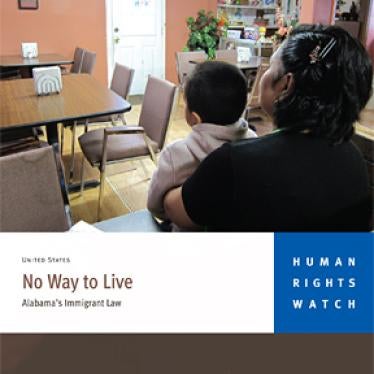(Washington, DC) – The US Supreme Court’s decision to uphold part of Arizona’s immigrant law puts immigrant families in Arizona and other states at greater risk of abuse from local authorities.
The June 25, 2012 ruling in Arizona v. United States overturned several sections of the Arizona law, the Support Our Law Enforcement and Safe Neighborhoods Act, commonly known as SB 1070, stating that they are pre-empted by federal law. But it left intact a section requiring police to attempt to verify a person’s immigration status if they have “reasonable suspicion” that the individual is in the country without authorization.
“The Supreme Court ruling opens the door to anti-immigrant abuses we’ve seen in other states with similar laws,” said Grace Meng, US researcher at Human Rights Watch. “The court said it was too soon to know what harm there might be from this one provision, but the harm from a similar provision in Alabama is all too clear.”
The court’s ruling on the law’s “reasonable suspicion” provision focuses on a narrow legal issue and does not foreclose other challenges to this provision. But this ruling could have immediate serious implications for immigrant communities and may encourage other states to adopt similar legislation. In a positive move, the court struck three other sections that would have criminalized unlawful presence and unauthorized work.
As Human Rights Watch documented in its 2011 report, “No Way to Live,” the Beason-Hammon Alabama Taxpayer Citizen and Protection Act, commonly known as HB 56, which contains a similar provision, resulted in increased incidents of discriminatory harassment by state authorities, as well as by private individuals emboldened by HB 56.
The harassment grew despite assurances from Alabama officials that racial profiling would not be condoned. Governor Jan Brewer of Arizona has made similar assurances, including by instituting training programs. But such measures are unlikely to prove sufficient to stop human rights abuses against immigrants.
The International Convention on the Elimination of All Forms of Racial Discrimination, which the United States ratified in 1994, requires federal, state, and local governments to ensure that their immigration policies do not have the effect of discriminating against people on the basis of race, color, descent, or national or ethnic origin. Even in cases in which specific police officers show no intent to discriminate, if their actions have discriminatory effects, the government is in violation of the treaty. In January 2010, the US State Department's legal adviser, Harold Koh, wrote to all state governors, including Arizona's Brewer, making them aware of their state’s obligations under the anti-racism treaty. Human Rights Watch also wrote to Arizona's attorney general in 2007 about the state's international legal obligations.
Legal challenges to similar laws in Georgia and South Carolina, as well as in Alabama, have been awaiting the Supreme Court’s decision in this case. States considering similar legislation should take the limited nature of the Supreme Court’s decision as a sign that such laws will not be easily upheld.
Even setting aside state laws, the US federal immigration system, as documented in several Human Rights Watch reports, frequently falls short of human rights standards, from failing to create safe conditions in immigration detention to failing to ensure that all victims of crimes, including immigrants, have access to justice. A patchwork of state immigration laws would only exacerbate the US government’s inability to regulate migration in a way that respects the rights of everyone within US borders.
The US Congress should promptly enact comprehensive immigration reform that would prevent the rights abuses resulting from existing and future state laws on immigrants.
“The Supreme Court’s decision does not absolve Arizona of its responsibility to protect the rights of all Arizona residents, nor Congress of its responsibility to enact meaningful immigration reform in keeping with human rights principles,” Meng said. “The decision only makes the need for federal reform more urgent.”







